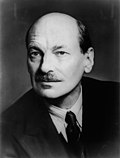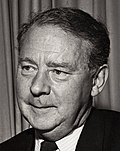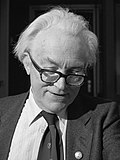Labour Party (UK)
The Labour Party is the main centre-left political party in the United Kingdom. It is a social democratic party. It has been one of the UK's two main political parties from the early 20th century to the present day. It is the largest party in the British House of Commons, with 412 out of 650 seats. It forms the Goverment. The current Labour Party leader and Prime minister is Sir Keir Starmer, who took over in April 2020 from Jeremy Corbyn.

The Labour Party has been in power in the United Kingdom government since July 2024.[18] It was in power in the Scottish Parliament (in coalition with the Scottish Liberal Democrats) until 2007. It is the largest group in the London Assembly, although until May 2016 the Mayor of London was a Conservative party member. It is also the largest party in local government.[19]
History
The party was officially formed in 1906, just after the general election, as a successor of the Labour Representative Committee formed in 1900. In 1918, the party made a new constitution with the commitment to socialism, or the socialization of the industry. This could be found in Clause 4. The Labour Party won the general election in 1945 for the first time. From 1951 Labour was in opposition for thirteen years, during which there were serious fights between the left and right wings of the party. The leader of the left wing was Aneurin Bevan. His supporters were called the "Bevanites". They wanted a less confrontational policy in foreign affairs and more socialist actions. The leaders of the right wing were Clement Attlee and Hugh Gaitskell. They believed that Western capitalism had changed a lot and that socialism and public ownership was not so important. Gaitskell tried to remove Clause 4 from the party constitution at the 1959 conference, but he could not.
In 1994, Tony Blair forced the Labour Party to drop Clause 4. This was an important step to change the party into "New Labour".
In 2015, dark horse candidate Jeremy Corbyn announced his candidacy for the leadership of the Labour Party. At the beginning, he was thought of as a socialist fringe candidate, but he later became the lead candidate in polls and got the support of the majority of trade unions affiliated to the Labour Party, along with those of three non-affiliated unions. On 12 September 2015, he was elected Leader of the Labour Party, with a majority vote of 59.5% in the first round of the ballot.
Past Leaders (since 1906)
- Keir Hardie, 1906–1908
- Arthur Henderson, 1908–1910
- George Nicoll Barnes, 1910–1911
- Ramsay MacDonald, 1911–1914
- Arthur Henderson, 1914–1917
- William Adamson, 1917–1921
- John Robert Clynes, 1921–1922
- Ramsay MacDonald, 1922–1931
- Arthur Henderson, 1931–1932
- George Lansbury, 1932–1935
- Clement Attlee, 1935–1955
- Hugh Gaitskell, 1955–1963
- George Brown, 1963 (Acting)
- Harold Wilson, 1963–1976
- James Callaghan, 1976–1980
- Michael Foot, 1980–1983
- Neil Kinnock, 1983–1992
- John Smith, 1992–1994
- Margaret Beckett, 1994 (Acting)
- Tony Blair, 1994–2007
- Gordon Brown, 2007–2010
- Harriet Harman, 2010 (Acting)
- Ed Miliband, 2010–2015
- Harriet Harman, 2015 (Acting)
- Jeremy Corbyn, 2015–2020
- Keir Starmer, 2020–present
Labour Prime Ministers
| Name | Portrait | Country of birth | Time in Office |
|---|---|---|---|
| Ramsay MacDonald | 
|
Scotland | 1924; 1929–1931 |
| Clement Attlee | 
|
England | 1945–1951 |
| Harold Wilson | 
|
England | 1964–1970; 1974–1976 |
| James Callaghan | 
|
England | 1976–1979 |
| Tony Blair | 
|
Scotland | 1997–2007 |
| Gordon Brown | 
|
Scotland | 2007–2010 |
| Keir Starmer[18] | 
|
England | 2024-present |
Labour Party (UK) Media
Keir Hardie, (1856–1915), first leader of the Labour Party contingent in the House of Commons
Ramsay MacDonald, first Labour prime minister (1924 and 1929–1931)
Clement Attlee, Prime Minister (1945–1951)
Harold Wilson, Prime Minister (1964–1970 and 1974–1976)
James Callaghan, Prime Minister (1976–1979)
References
- ↑ O'Shea, Stephen; Buckley, James (8 December 2015). "Corbyn's Labour party set for swanky HQ move". CoStar. Archived from the original on 9 October 2017. Retrieved 8 October 2017.
- ↑ "Contact". Labour Party. Archived from the original on 24 September 2020. Retrieved 14 September 2020.
- ↑ "Nigel Farage claims Reform UK has 200,000 members and has warning for Labour". Sky News. 9 February 2025. https://news.sky.com/story/nigel-farage-claims-reform-uk-has-200-000-members-and-has-warning-for-labour-13306272. Retrieved 9 February 2025.
- ↑ Worley, Matthew (2009). The Foundation of the British Labour Party: Identities, Cultures, and Perspectives,1900–39. Farnham: Ashgate Publishing. ISBN 978-0-7546-6731-5 – via Google Books.
- ↑ Nordsieck, Wolfram (2019). "United Kingdom". Parties and Elections in Europe. Archived from the original on 11 October 2012. Retrieved 21 January 2020.
- ↑ Bakker, Ryan; Jolly, Seth; Polk, Jonathan (14 May 2015). "Mapping Europe's party systems: which parties are the most right-wing and left-wing in Europe?". London School of Economics / EUROPP – European Politics and Policy. Archived from the original on 26 May 2015. Retrieved 26 May 2015.
- ↑ Giddens, Anthony (17 May 2010). "The rise and fall of New Labour". New Statesman. http://www.newstatesman.com/uk-politics/2010/05/labour-policy-policies-blair. Retrieved 26 May 2015.
- ↑ Peacock, Mike (8 May 2015). "The European centre-left's quandary". Reuters. http://uk.reuters.com/article/uk-europe-left-analysis-idUKKBN0O905M20150524. Retrieved 26 May 2015. "A crushing election defeat for Britain's Labour party has laid bare the dilemma facing Europe's centre-left.".
- ↑ Dahlgreen, Will (23 July 2014). "Britain's changing political spectrum". YouGov. Archived from the original on 26 May 2015. Retrieved 26 May 2015.
- ↑ Budge 2008, pp. 26–27.
- ↑ [6][7][8][9][10]
- ↑ https://archive.today/20140523051814/http://www.gbc.gi/news/news-details.php?id=3695
- ↑ "National Flag Usage & Straplines". General Election Brand Guidelines 2024 (PDF). Labour party. 2024. p. 6. Archived from the original (PDF) on 29 February 2024. Retrieved 27 May 2024.
- ↑ "Labour vow to 'get Britain's future back' as conference kicks off in Liverpool". Sky News. Retrieved 13 January 2024.
- ↑ "Open Council Data UK – compositions councillors parties wards elections". opencouncildata.co.uk.
- ↑ Brivati & Heffernan 2000.
- ↑ Thorpe 2008, p. 8.
- ↑ 18.0 18.1 Guy, Rob Picheta, Lauren Said-Moorhouse, Billy Stockwell, Peter Wilkinson, Sarah Tilotta, Ivana Kottasová, Christian Edwards, Thom Poole, Jack (4 July 2024). "UK election results: Live updates". CNN. Retrieved 10 July 2024.
- ↑ "Local elections 2024 results in maps and charts". BBC News. 26 March 2024. Retrieved 10 July 2024.







